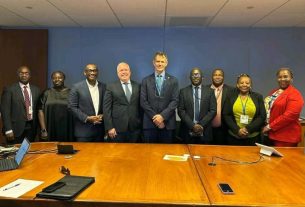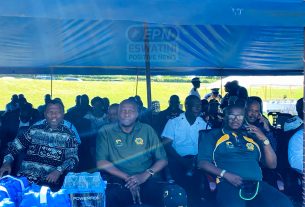BY EPN
MBABANE – The Trade Union Congress of Swaziland and Business Eswatini released a joint statement summarising the first bipartite dialogue between labour and employers Eswatini. The statement reads as follows:
Bipartite dialogue to encourage peace and unity in the workplace, while promoting prosperity for all by way of jobs, concluded at the Happy Valley Hotel in Ezulwini (10-11 May 2022).
Joint Statement
Organised Business and Organised Labour held an official bipartite dialogue in Ezulwini on 10th and 11th May 2022 at the Happy Valley Hotel. The primary aim of the dialogue was to identify and deliberate on the issues which pose a threat to existing jobs or stand in the way of creating new employment opportunities for the thousands of Emaswati who are without jobs. COVID-19 and the social unrest that ensued further exacerbated the situation of joblessness in the country.
During the meeting The President of Business Eswatini (BE) Mr. Andrew le Roux and the President of the Trade Union Congress of Swaziland (TUCOSWA), Mr. Bheki Mamba led the delegations respectively.
The Parties acknowledged with appreciation their existing bilateral cooperation agreement and welcomed the progress achieved through this instrument particularly in the spheres of dispute-resolution at enterprise-level. Furthermore, they appreciated the partnership on areas that advanced their mutual interest more so as they are both classified as apex organizations in the country.
The Parties agreed that the bipartite meeting constitutes the baseline for social dialogue not only at enterprise level, but also at national level. The Parties further recognized that out of the thematic areas identified, much of the strategies proposed to address the issues which threaten current and future jobs should be brought to the attention of other stakeholders outside of this meeting. As a result, the parties agreed that at the conclusion of the dialogue, the report should be shared with the key stakeholder, Government, with the hope that the issues identified shall be pursued at a higher level such as by the tripartite or tripartite (plus), whatever the case will be.
The Parties further acknowledged that this is the first bipartite dialogue of its kind in the country. They agreed that the challenges they face in the world of work in 2022 and beyond, are unique and unprecedented. As a result, employers would not be competent to resolve them by themselves, neither can the workers. Notwithstanding, the Parties reaffirmed that they need each other to find common solutions to these unique challenges.
Encouraged by the knowledge that when the Parties begin to earnestly put their heads and efforts together around these problems, solutions would not evade them; even if they end up agreeing to disagree on some of the issues tabled for discussion.
While these challenges have been building over a number of years, if not decades, the Parties identified thematic areas to initiate their discussions; namely:
(a) Employment protection and job creation by considering the actions required to preserve the current jobs; while making vigorous attempts to create new ones, especially for the youth.
(b) The future of work, which looked at the state of the country’s readiness to the insidious effects of the fourth industrial revolution on the labour market;
(c) The recognition of skills as a driving force of economic growth vis-à-vis those which are currently produced or available for industry in the country;
(d) The effects of climate change on the labour market and food security; and
(e) Industrial relations issues, specifically trade union governance; violent industrial action which has resulted in the destruction of company assets which in turn pose a threat to existing jobs, and difficulties of trade union recognition, even where the unions had met all the requirements for recognition at shop-floor level.
In addition to identifying issues outside the thematic areas, both Parties expressed concern that Eswatini is undergoing deep socio-economic and political crises, both of which require everyone’s serious attention.
The dialogue was convened under the guiding principles of Acceptance, Equality and Transparency; and all efforts were channeled towards identifying the issues on the ground and formulating strategies on how to address the stated challenges.
In so many respects, the Parties were in agreement on not only the thematic areas identified for discussion but also the issues raised by each of them, such as:
- The need to reconfigure the education system to address the skills challenges including responses to the effects of the fourth industrial revolution; and the urgent need for Government to avail training incentives to employers who upskill their workers.
- The need to create a tripartite platform to deal with issues of employment protection and job creation, such as the Ministry of Education, and Ministry of Finance, the Ministry of Natural Resources and Energy on issues of climate change affecting the labour market.
- The importance of research and development was emphasized especially its relevance to respond to the challenges identified in the thematic areas and to inform the policies which will bring solutions to them.
- Political-will is necessary not only at Government level but also at enterprise level between employers and workers to implement sound policies that build the economy for the betterment of the livelihoods of all Emaswati.
- The parties identified the issues of corruption and nepotism that were opined as being buoyed by the pervasive culture of institutionalized patronage.
- These two issues were cited as national plagues that need to be combated both in the private and public sectors.
- With regard to trade union governance, it was agreed that factions are like a cancer that is jointly caused by incapacity on the part of Employers and Workers alike, and as such both parties may need assistance in the form of capacity-building in this regard.
- The existence of trade unions is a human rights issue and cannot be done away with. It was thus agreed that trade union recognition are matters of law, and where there are rights involved, they cannot be simply disregarded by others without legal justification.
- While it was noted that the employer-employee relationship is founded on conflict, it was stated that trade unionism thrives where employers fail to be on the same page as workers. The Parties acknowledged that the solutions to recognition and industrial action issues do not always require invoking the law but may be resolved through engagement and dialogue, at bipartite level.
- Having identified some of the causes or triggers of violent industrial action, which included: protracted negotiations, the inclusion of third parties and state security organs when industrial relations issues and tension arise, and the use of replacement labour during lawful strikes; a call was made for the review of all the draconian legislation to bring them into alignment with best practice. More-so because it was noted that the Public Order Act is dichotomous in some sections as it gives the worker rights on the one hand, and on the other takes away those rights.
- The Parties acknowledged the progress made towards solving the industrial relations tensions at enterprise level as they jointly agreed to the setting up of a sub-committee constituted by their respective representatives to engage on these issues soon after their meeting. It was stressed that these issues be resolved before the envisaged tripartite is convened
- These two issues were cited as national plagues that need to be combated both in the private and public sectors.
- With regard to trade union governance, it was agreed that factions are like a cancer that is jointly caused by incapacity on the part of Employers and Workers alike, and as such both parties may need assistance in the form of capacity-building in this regard.
- The existence of trade unions is a human rights issue and cannot be done away with. It was thus agreed that trade union recognition are matters of law, and where there are rights involved, they cannot be simply disregarded by others without legal justification.
- While it was noted that the employer-employee relationship is founded on conflict, it was stated that trade unionism thrives where employers fail to be on the same page as workers. The Parties acknowledged that the solutions to recognition and industrial action issues do not always require invoking the law but may be resolved through engagement and dialogue, at bipartite level.
- Having identified some of the causes or triggers of violent industrial action, which included: protracted negotiations, the inclusion of third parties and state security organs when industrial relations issues and tension arise, and the use of replacement labour during lawful strikes; a call was made for the review of all the draconian legislation to bring them into alignment with best practice. More-so because it was noted that the Public Order Act is dichotomous in some sections as it gives the worker rights on the one hand, and on the other takes away those rights.
- The Parties acknowledged the progress made towards solving the industrial relations tensions at enterprise level as they jointly agreed to the setting up of a sub-committee constituted by their respective representatives to engage on these issues soon after their meeting. It was stressed that these issues be resolved before the envisaged tripartite is convened.
The Parties also agreed that jobs are the best insurance against poverty, especially for the vulnerable, and they therefore reaffirmed their commitment to protecting jobs, promoting employment-creation, promoting industrial peace and stability, and the importance of resolving disputes speedily.
The Parties reiterated the importance of their continued partnership even after the dialogue, stating that it is important to find opportunities to bring their minds together to discuss issues of mutual interest and devise solutions to them. Crucially, a call was made by the Parties for stronger institutions, such as the media, the judiciary as well as action to address service delivery shortcomings. They stated that law and order require effective and impartial organs of State. This was emphasized in particular in reference to the issues they often face in the political and economic environment in which they exist.
Thus agreed and confirmed by the parties:
Signed on 20 May 2022 at Emafini Business Centre in Mbabane



